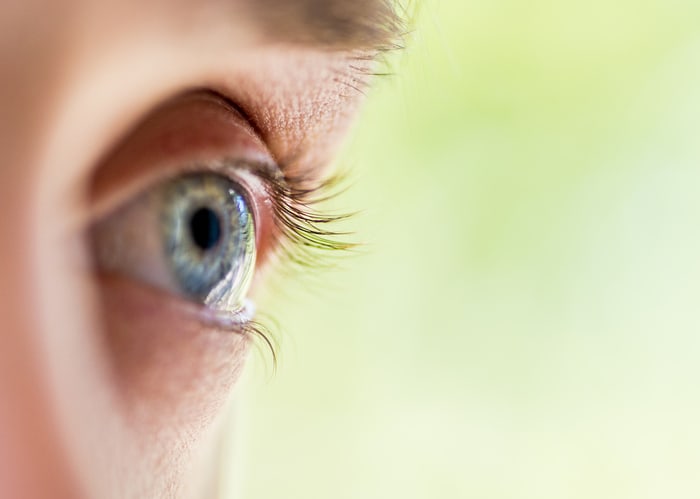-
What are cataracts?

How much do you know about cataracts? Cataracts are extremely common, affecting more than 20.5 million Americans over the age of 40. In fact, by age 65, it’s estimated that more than 90% of people in the United States will develop cataracts, and by the time they’re 75, those cataracts will have a major impact on their vision. Knowing those statistics, it’s a good idea to know a little bit about cataracts.
- What is a cataract? Typically found in people over age 55, a cataract is an opaque or cloudy area in the lens of the eye. Cataracts can be found in one or both eyes, but don’t spread from one eye to the other. They interfere with vision because they cause the light entering the eye to be scattered, rather than properly focused.
- What are the symptoms of cataracts? Cataracts form slowly and cause blurred or hazy vision, reduced intensity of colors, increased sensitivity to glare, and increased difficulty seeing at night.
- Are there different types of cataracts? Nuclear cataracts are located in the center of the iris, while cortical cataracts affect the layer of the lens that surrounds the nucleus, and posterior cataracts are on the back outer layer of the lens. Posterior cataracts develop most rapidly.
- How can cataracts be prevented? You can’t really prevent cataracts, but you can reduce your risk of developing cataracts by eating a nutrient-dense diet, not smoking, and keeping diabetes under control. Limiting alcohol consumption, protecting your eyes from the sun, and seeing your eye doctor regularly are also good steps toward cataract prevention.
- What’s the best treatment for cataracts? If a cataract doesn’t affect your vision, it may not require treatment. Even if it does, you can often just treat the symptoms of a cataract, by wearing eyeglasses, using brighter lighting, wearing anti-glare sunglasses, or using magnifying lenses. The only way to treat a cataract itself, though, is through surgery.
- What’s involved in cataract surgery? Cataract surgery involves removing the cloudy lens and replacing it with an artificial one. Cataract surgery is one of the most common, and safest, surgeries performed in the United States. Your eye doctor will be able to help you determine whether it’s right for you.
If you are looking for an eye doctor, the Gerstein Eye Institute in Chicago can help. Since 1968, the Gerstein Eye Institute has been providing exceptional ophthalmologic care to patients in the Chicago area. With decades of experience in ophthalmology, our certified professional staff members have together performed over 30,000 procedures. To schedule a consultation, call us at 773.596.9545 or contact us through our website.
-
How to Strengthen your Vision and Keep it Strong
Your vision is precious, and protecting it as you age is one of the most important things you can do to maintain your quality of life. Since sight-threatening eye problems affect one in six adults over the age of 45, it’s extremely important to take steps to keep your eyes healthy and your vision strong. Fortunately, there are steps you can take to care for your eyes.
- Know your risk. Some health conditions can raise your risk of developing eye diseases
 If you have high blood pressure, multiple sclerosis, or diabetes, for example, you’re at risk for eye problems. Even if you don’t have a medical condition yourself, your family’s health history can have an impact on your eye health.
If you have high blood pressure, multiple sclerosis, or diabetes, for example, you’re at risk for eye problems. Even if you don’t have a medical condition yourself, your family’s health history can have an impact on your eye health. - Be proactive. Take charge of your health, seeing your doctor regularly and following medical advice to the letter. Manage medical conditions, particularly those that cause chronic inflammation, to protect your eyes. Pay attention to your vision, and report any changes to your eye doctor immediately. Some symptoms that warrant prompt attention include double vision, hazy vision, difficulty seeing in low light, red eyes, frequent flashes of light, floaters, eye pain, and swelling.
- Eat your veggies. A healthy, balanced diet is important for your eyes, and that diet should include Vitamins A, C, and E, as well as zinc, carotenoids lutein and zeaxanthin, and Omega-3 fatty acids. You can get these nutrients by eating a variety of colorful fruits and vegetables, dark leafy greens, eggs, salmon, and flaxseed.
- Stay active. Studies have shown that regular exercise can reduce the risk of age-related macular degeneration by as much as 70 percent.
- Be protective. Wear protective eyewear when you’re doing anything that could injure your eye. This means protecting your eyes from anything that could cause damage or injury, including chemicals, sharp objects, and UV rays.
- Stop smoking. It’s best if you never smoke at all because smoking can raise your risk of developing age-related macular degeneration, cataracts, uveitis, and other eye problems. Even if you have been a smoker, stopping now can improve your eye health.
- See your doctor. At least every two years, have a comprehensive eye exam to determine your risk for major eye diseases. It’s also important to see your eye doctor regularly to make sure your prescription for eyeglasses or contacts is up to date.
If you are looking for an eye doctor, the Gerstein Eye Institute in Chicago can help. Since 1968, the Gerstein Eye Institute has been providing exceptional ophthalmologic care to patients in the Chicago area. With decades of experience in ophthalmology, our certified professional staff members work hard to provide the kind of personalized care that keeps patients coming back year after year, eventually entrusting the eye health of their children and grandchildren to us as well. To schedule an appointment, call us at 773.596.9545 or contact us through our website.
- Know your risk. Some health conditions can raise your risk of developing eye diseases
